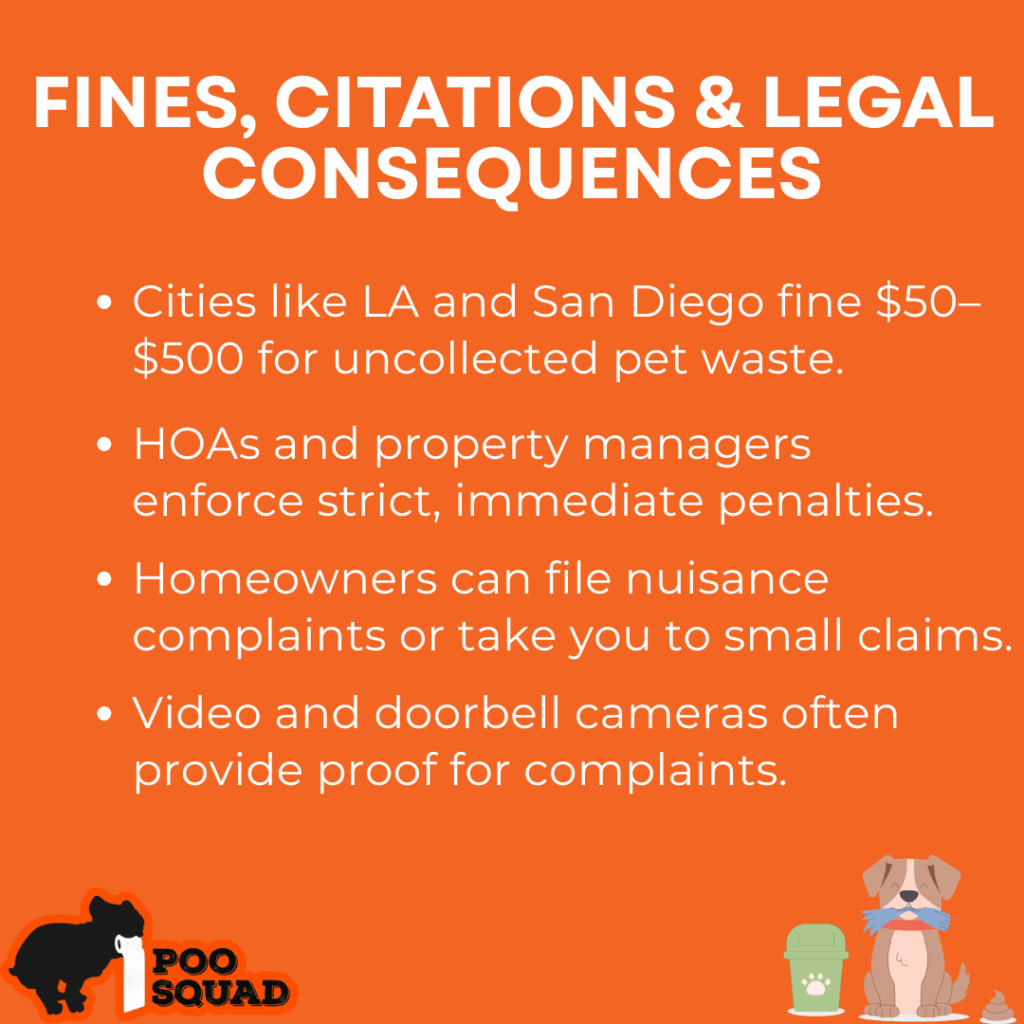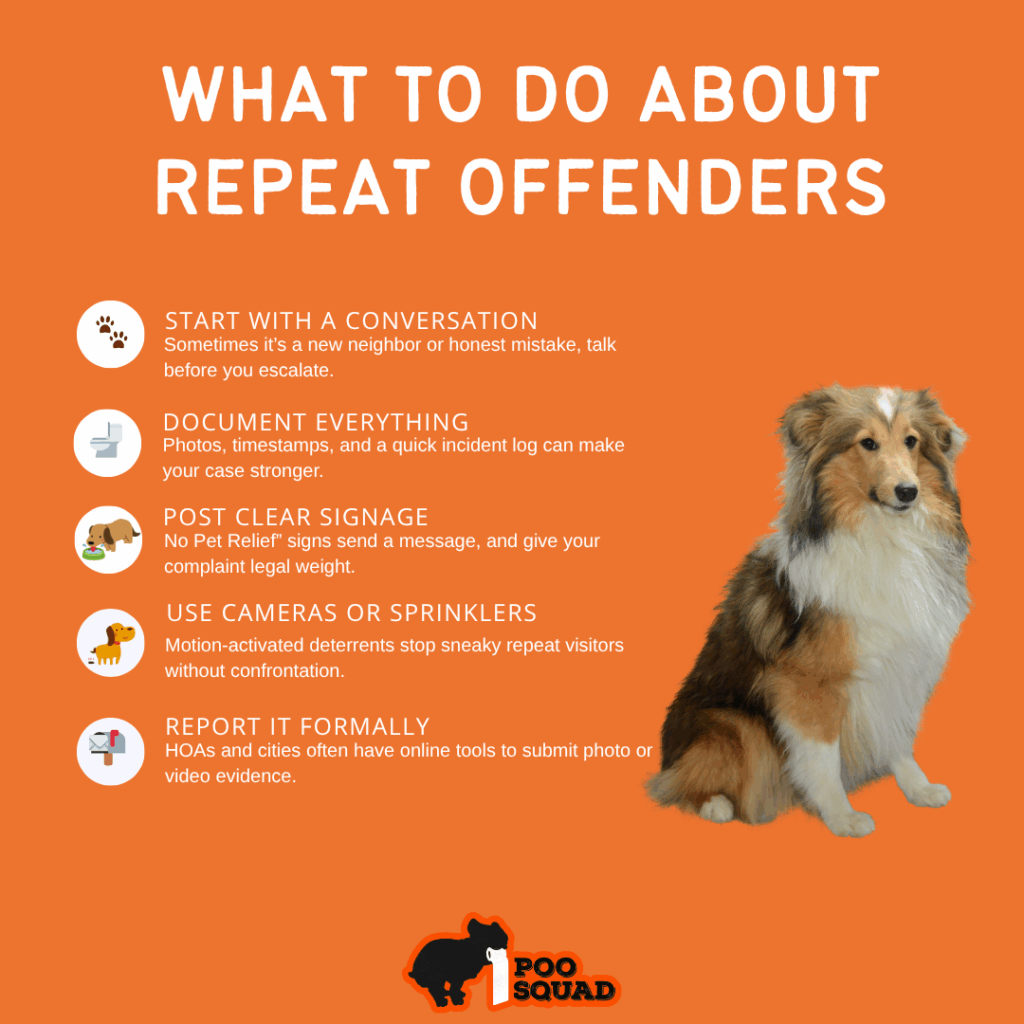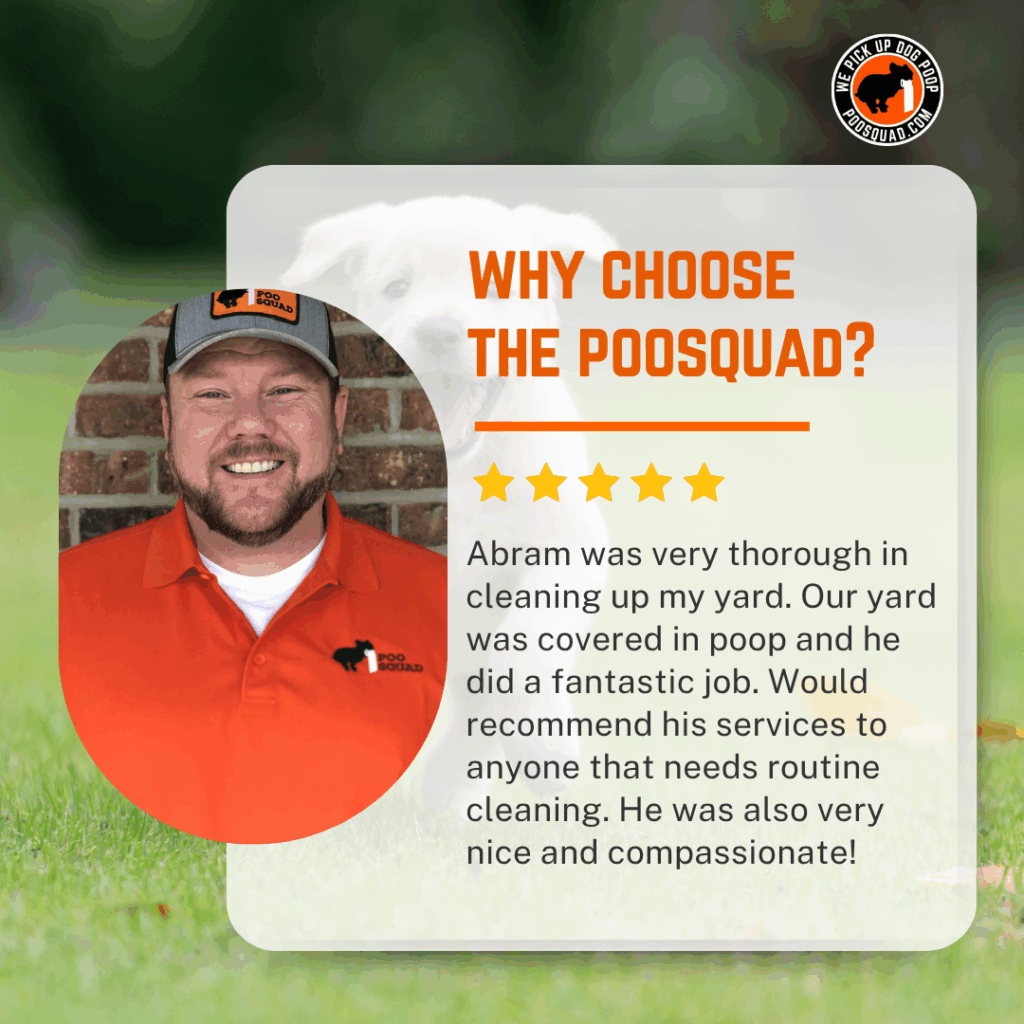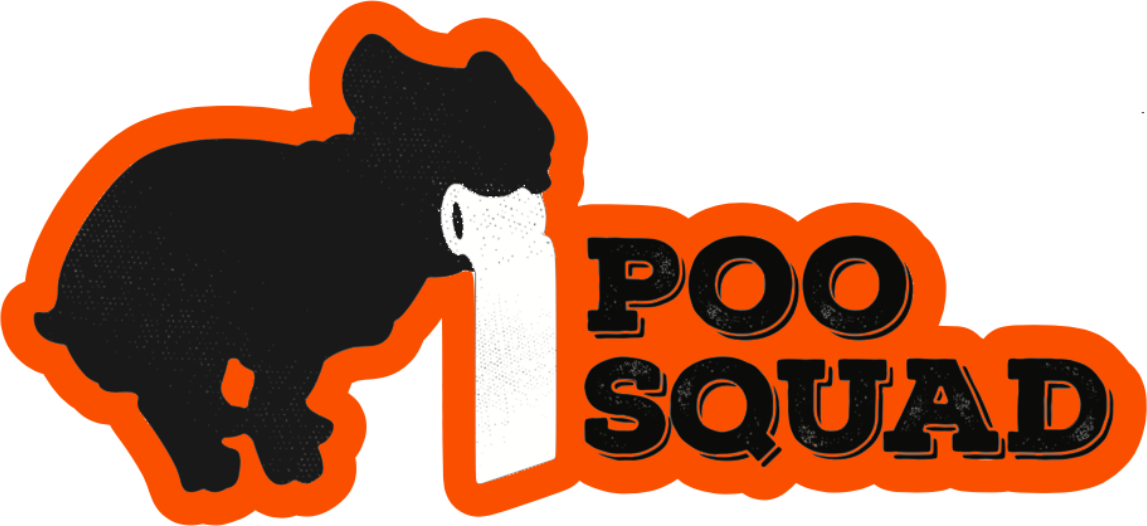Yes, it can be illegal to leave dog poop in someone’s yard, even if you pick it up. Many cities have ordinances, and HOAs enforce trespassing or sanitation fines. Repeated offenses may lead to citations or small claims disputes, especially when there’s property damage or surveillance proof.
Yes, leaving dog poop in someone else’s yard can violate local laws, HOA rules, or sanitation codes. Even when it’s picked up, property owners may still report it as trespassing or nuisance behavior. In some cities, that means real fines and legal consequences.
Many dog owners assume cleaning up the mess is enough. But from a legal perspective, the act of stepping onto private property with your pet, especially without permission, can trigger fines or complaints. Homeowners have every right to protect their space, and repeated violations often escalate into conflict.
We’ve seen what happens when these situations go unchecked: doorbell camera footage, warning signs, HOA violations, and neighborhood feuds. Dog waste might seem minor, but the social and legal fallout rarely is.
What local laws say, how property boundaries matter, and what you can do, whether you’re the homeowner fed up with mystery piles or the dog parent trying to stay in good standing. We’ll also explain how our residential dog poop cleanup service helps prevent conflict before it starts.
What the Law Says About Dog Poop on Private Property
When it comes to leaving dog poop in someone else’s yard, the law doesn’t see it as a joke. In most cases, it’s not impolite, it’s a legal violation that can carry financial and social consequences. Cities enforce this through sanitation laws, nuisance claims, and even civil courts.

Is It Illegal to Leave Dog Poop in Someone Else’s Yard?
In many parts of the U.S., especially cities like Los Angeles and Toronto, leaving dog waste on someone else’s property can result in fines that range from $50 to $500. And it doesn’t have to be deliberate. Even if your dog does its business during a quick leash tug and you fail to notice, it still counts.
Local pet waste laws, often buried in health or animal control codes, give cities the authority to issue citations. And they’re doing it more frequently, especially in residential areas where homeowners are fed up. What’s worse? Multiple offenses usually lead to higher penalties.
Some areas enforce what’s called a “scoop law,” which doesn’t apply to parks or sidewalks. Private yards fall under these laws, too, especially if there’s signage posted.
Is Picking It Up Enough?
Not always. Even if you carry bags and do your part, stepping onto private property without permission can be treated as trespassing. That’s especially true in HOA communities or areas where homeowners have put up clear no-entry signage.
We’ve had customers share stories of being approached, yelled at, or even threatened, even when they picked up after their pup. And it makes sense. From the homeowner’s perspective, your dog stepping foot onto their lawn is an intrusion. Picking up the mess doesn’t erase that.
For folks who want to avoid these tense interactions entirely, our weekly pooper scooper service takes the stress off your shoulders and keeps the peace with your neighbors.
Trespassing vs. Public Right-of-Way
It’s easy to assume that walking your dog along a neighborhood sidewalk is harmless. But the moment your pup’s paws cross that invisible line into someone’s yard, even for a quick sniff or a squat, you’re treading into a legal gray area.
Understanding the difference between public access and private property is crucial if you want to avoid fines or neighbor feuds.
Is Walking a Dog Near a Yard Legal?
Generally, sidewalks and city easements are fair game. But what many pet owners don’t realize is that lawns that butt up against sidewalks are often still considered private property. If your dog steps off the curb and into that space, technically, you’re entering without permission.
This gets even trickier in HOA neighborhoods where community rules layer on top of city laws. In some places, simply allowing your dog to step on someone’s grass, even without pooping, can result in a formal complaint.
Can a Neighbor Tell You Not to Walk There?
They can, and many do. If a neighbor has expressed discomfort or posted signs like “No Pets on Lawn,” continuing to walk there could put you at risk of a trespass claim. And it doesn’t need to be legally enforced for the tension to build. We’ve heard from clients who were banned from walking on certain streets by neighbors or even the HOA after only one dog poop incident.
This is where our pet-friendly yard deodorizing service can make all the difference. If you’re dealing with ongoing tension or you’ve inherited a yard that’s been a poop hotspot for other people’s dogs, we can help reset the space and give you a clean slate, literally.
Fines, Citations, and Legal Consequences
If you think poop disputes end with dirty looks from across the driveway, think again. Many cities and HOAs enforce fines for uncollected dog waste, and even if it’s picked up, property entry can still land you in hot water. Understanding what penalties exist and how they’re enforced can save you from expensive surprises.

What Can Happen Legally?
Local governments often enforce pet waste ordinances through sanitation or public health codes. For example, in cities like Los Angeles and San Diego, fines for leaving pet waste can range from $50 for a first offense to $500 or more for repeat violations. That’s assuming no damage or illness resulted; otherwise, things escalate quickly.
Homeowners can also file nuisance complaints or take offenders to small claims court for emotional distress, lawn damage, or sanitation costs. And when a property manager or HOA is involved, expect rules to be stricter and fines more immediate.
We’ve seen clients fined by their HOA even when the poop wasn’t theirs, only because they didn’t contest it fast enough.
What If Someone Has No Proof?
This is a big worry for pet owners. What if someone falsely accuses you? While it’s rare to get fined without proof, some neighbors are quick to escalate. A growing number of homeowners now rely on doorbell cameras or yard surveillance to back up their complaints, which can be submitted as evidence in court or to local authorities.
If you’re a renter, it’s even more complicated. Landlords sometimes pass the blame and fees directly to tenants without a fair hearing.
That’s part of why our clients love how visible and accountable our service is. With bright uniforms, automated text reminders before we arrive, and post-service photo confirmations of closed gates, we keep things transparent, clean, and neighbor-proof.
Health Hazards of Dog Waste (And Why It Matters Legally)
Dog poop is not only a smelly nuisance; it’s a legitimate health hazard. That’s why so many cities treat it as more than a cleanliness issue. From bacteria to parasites, uncollected waste poses serious risks that can affect children, pets, and even local water systems. These risks help explain why the law takes it seriously.
Why It’s More Than Gross Only
One gram of dog poop can contain over 23 million coliform bacteria. These pose serious risks to humans and pets, as explained in our guide on bacteria in dog poop and its risks. It can linger on grass, seep into soil, and be picked up on shoes or paws, turning a simple yard visit into a sanitation nightmare.
For families with kids who play outside, this is not theoretical. We’ve had multiple customers tell us they couldn’t use their backyards until we started cleaning them regularly. Even dogs can get reinfected when exposed to old waste.
And when it rains, the problem spreads. Pet waste runoff enters storm drains, which lead to local rivers, lakes, and ponds. That’s part of why cities fine offenders, not only to punish them, but to fund environmental cleanup.
“It’s Fertilizer” and Other DIY Myths
One of the biggest misconceptions we hear is that dog poop is “natural” and helps fertilize the lawn. That couldn’t be further from the truth. Unlike manure from herbivores, dog waste is acidic, nitrogen-heavy, and full of harmful bacteria. Instead of enriching your grass, it kills it. Mowing over it only spreads the bacteria more evenly.
That’s why our yard sanitation and deodorizer services are in such high demand. They’re not about covering up the smell; they’re about creating a genuinely safe and clean space that doesn’t put your family or neighbors at risk.
What to Do About Repeat Offenders
When it comes to unwanted dog poop on your lawn, a single incident is annoying, but repeat offenses?
That’s war. Whether it’s a neighbor with a wandering dog or someone using your yard as their personal rest stop, there are clear steps you can take that are both effective and legally sound.

If You’re the Neighbor Dealing With It
Start with communication. A calm, direct conversation often goes a long way, especially if the person doesn’t realize it’s happening. We’ve heard stories from clients who were ready to file police reports, only to discover the dog belonged to a new neighbor who thought the yard was a public easement.
But if that doesn’t solve it?
- Post polite but firm signage (“Private Property – No Pet Relief Area”).
- Log each incident, dates, times, and photos if possible.
- Install motion-activated cameras or sprinklers as deterrents.
- Report to your HOA or city sanitation office with documentation in hand.
Many municipalities have specific complaint procedures for this kind of recurring issue, and having a paper trail makes all the difference. Some cities will even let you submit photo or video evidence through their online platforms.
If You’re the Dog Owner Being Confronted
Maybe you’re the one under scrutiny. You’ve cleaned up after your dog every time, but now you’re getting dirty looks or threats from a neighbor. If that sounds familiar, you’re not alone. Plenty of responsible pet owners still get caught in the crossfire when a dog steps even slightly off the sidewalk.
To avoid these situations:
- Keep your dog close to the curb, especially near known “no-dog zones.”
- Carry extra bags and use them immediately.
- Avoiding the same yard every day, a routine can breed resentment.
- Never assume cleanup is enough if you’re crossing property lines.
The easiest way to prevent neighbor disputes entirely?
Stop doing it yourself. Our weekly residential dog waste pickup gives you back your time, keeps your dog’s routine intact, and ensures no poop ends up where it doesn’t belong. Because let’s be honest, no one wants to be “that neighbor.”
How to Protect Your Property from Future Poop Offenses
Even if you’ve had a single incident or only want to avoid one, there are smart, simple ways to protect your lawn without turning your home into Fort Knox. A little prevention goes a long way when it comes to keeping your yard clean, your pets safe, and your relationships with neighbors intact.
Prevention Tools That Work
We’ve seen it all, and the solutions that tend to work best are:
- Motion-activated sprinklers: Harmless, effective, and surprising enough to send a clear message.
- Citrus-based dog repellents: Most dogs dislike the scent and avoid treated areas entirely.
- Visible signage: Keep it respectful, but clear. “Private Property: No Dogs” is enough.
- Gravel or mulch barriers: Dogs avoid these textures, making them less likely to wander onto your lawn.
Another underrated tip?
Lighting. Brightly lit yards discourage both dogs and distracted owners who may be trying to cut corners after dark.
Documenting for Legal or HOA Action
If the problem persists, start building a log. Jot down the date, time, and what happened, especially if you caught it on camera. Footage from doorbell or security cams holds up surprisingly well in disputes with HOAs or in small claims court.
We’ve even had customers send us their footage during onboarding, only to confirm they’re not imagining the issue.
And we take that seriously. Our crews arrive in fully branded trucks, wear bright orange, and follow strict sanitation protocols between yards. If you’re looking to reclaim your space and protect your property without confrontation, our dog poop pickup service does exactly that, quietly, respectfully, and on schedule.
Why a Professional Solution Is the Easiest Way to Avoid All of This

You could argue with the neighbor, post signs, or walk with a camera strapped to your dog’s collar. Or, you could eliminate the whole problem by outsourcing the stress. Hiring a professional dog waste removal service is not only about cleanliness. It’s about trust, safety, and protecting your time and reputation.
How We Help You Stay Legal (and Stress-Free)
Our services are built around solving the exact problems:
- Branded trucks and bright orange uniforms mean your neighbors never wonder who’s in the yard.
- Pre-arrival reminders and post-service gate photos give you confidence that everything’s been handled securely.
- We sanitize tools and shoes between yards, eliminating the risk of cross-contamination and potential legal issues tied to pet illness or lawn damage.
- We never use your hose, trash cans, or tools, so there’s no question about what’s touched what.
- And if your yard has been a target for repeat offenses, you might also want to see our guide on how to stop a neighbor’s dog from pooping in your yard.
People assume picking up dog poop is only about saving time, but for our clients, it’s about peace of mind. Whether it’s HOA regulations, city citations, or a cranky neighbor with a doorbell camera, we make sure none of it lands on you.
Dog Poop Might Be Small, But the Consequences Aren’t
Leaving dog poop in someone’s yard, on purpose or by accident, can create real legal, social, and health consequences. Local ordinances, HOA rules, and nuisance laws give homeowners the right to push back, and they often do. Even if you’re the one cleaning up, the wrong move can still cost you.
But this doesn’t have to be your problem.
Our goal is simple: protect your property, save your time, and make sure no one in your family has to argue over who’s on poop duty again. Whether you need weekly dog poop cleanup, pet-safe yard deodorizing, or only a partner who shows up when they say they will, we’re here to help.
Skip the conflict. Skip the fines. Let us do what we do best, so you don’t have to think about it again.
Frequently Asked Questions About Dog Poop Laws and Property Rules
Even responsible dog owners run into confusing rules, unclear boundaries, and occasionally, a very vocal neighbor. These are the questions we hear most often, answered clearly and practically.
Can I Get Fined If My Dog Poops in Someone’s Yard and I Clean It?
Yes, depending on local ordinances. Many cities treat entry onto private property as a violation, whether or not waste is left behind. Even if you clean up after your dog, the act of crossing that line without permission can still be considered trespassing in certain areas.
What If the Lawn Has No Fence or Sign?
Lack of signage doesn’t make the property public. Many homeowners assume their yard is protected by the general expectation of privacy. If you regularly allow your dog to step off the sidewalk, even if they don’t relieve themselves, it can still be a problem.
Can a Neighbor Ban Me from Walking on Their Side of the Street?
If it’s a private community or managed by an HOA. In public neighborhoods, they can’t legally ban you from the sidewalk, but they can file complaints if your dog continues to enter their property. It’s about pattern and perception; repeated actions carry more weight.
What If I’m Accused With No Proof?
False accusations happen, and they’re frustrating. Still, if you’re ever approached, stay calm and polite. Offer to adjust your walking route and, if needed, use a leash cam or GPS-enabled collar to document your routine. This builds your case in case things escalate.
Do I Need a Service Like Yours?
Not everyone does, but if you’re tired of the stress, complaints, or awkward sidewalk encounters, our residential dog waste pickup offers a quiet solution. We handle it all, stay out of neighbor drama, and keep your yard (and record) spotless.
